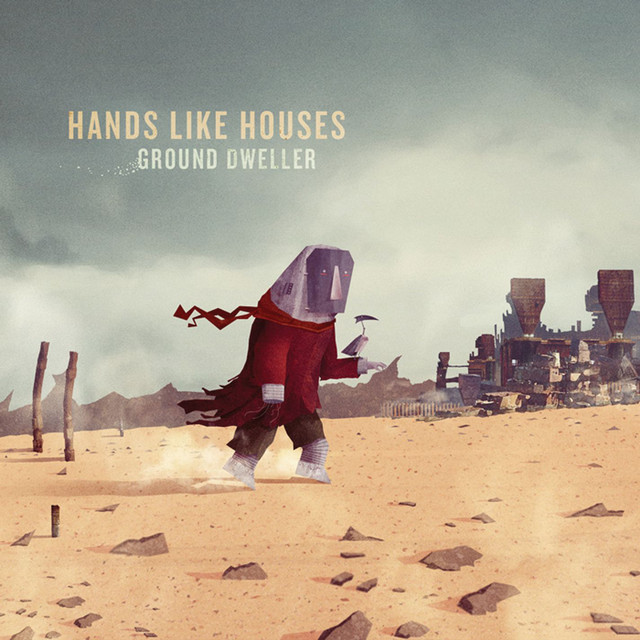Killer Klassix: Hands Like Houses – Ground Dweller
Hands Like Houses use melody, aggression and sensual emotion to build a musical world that ensnares the listener and holds their attention for the full album.
January 30, 2023
When choosing this week’s album for review, I thought hard about what albums really are inhibitive of the listener, albums that really just slow down your breathing, widen your eyes with excitement and establish a tangible atmosphere. “Ground Dweller,” by Australian natives Hands Like Houses, exhibits an atmospheric debut, showcasing the versatility and impact of a hardcore offshoot in need of change.
On March, 13, 2012, Hands Like Houses released their debut album “Ground Dweller,” disrupting the popular Metalcore scene, which dominated the majority of alternative record releases since 2008. Rise Records was in desperate search to release something fresh and nuanced, something slightly connected to the genre, but far enough from the aggression of metalcore to appeal to a broader majority of the alternative music community. At the time, Hands Like Houses formed from the dissolvement of two bands, So Long Safety and Eternal Debut.
The album is an immersive debut, combining the aggression of metal-esque drum grooves and sensual, soulful vocals and polyrhythmic harmonies. One of the highlights of the album is the musical composition. Keyboardist Jamal Sabat, and guitarists Matt “Coops” Cooper and Alex Pearson exhibit an exploration of melody, complimenting and expanding on musical undertones layered over the album. Meanwhile, vocalist and main lyricist, Trenton Woodley exhibits poetic prose and whimsical narrations, emoting not only relative emotions, but transporting the listener to a land beyond imagination.
“Antarctica,” the introductory track of the album, masterfully exhibits the experimental approach to musical composition, incorporating a surreal use of synth-bass rhythms and applying subtle transitions between aggressive repetitive melodies and sensual vocals. In an interview with Alt Press, vocalist and lyricist, Trenton Woodley, broke down the album. “Antarctica” is about “growing up, being taught to stay grounded while reaching for your dreams so that you’re stronger and able to keep pushing for them even when you’re knocked down.”
“This Ain’t No Place For Animals” was released as the single to promote the album, but it also further exhibits experimental-progressive composition. The track, introduced by way of poly-rhythmic lullaby, explodes in sensual aggression. The track is pushed and pulled between micro-aggressive rhythms and accessible drum grooves, grounding the track in a post-hardcore aesthetic. Woodley’s passion shines through, stating in the Alt Press interview, “this track is about how people interact, with all our brokenness in between; people fight, people collide and try to figure out what is wrong – with you or the world around you.”
Woodley’s point is further supported by the track’s chorus: “Someone call in the emergency and we’ll peel back the dressings so we can see/The kind of things that the surgeons see,/When the bloodwork won’t give us the answers./They’ll never tell us, because they don’t know what’s killing us.”
“The Definition of Not Leaving” is one of my personal favorites, demonstrative of the effect of a deviation track, but it effectively uses what makes them unique as another band apart from the scene. The track perfectly immerses the listener in an ethereal metaphor, using the synths as melodic framework and toning down the electric drum to substitute a harmonious baseline. Woodley once again masterfully displays the versatility of his craft, altering his sensual vocals to emulate an ominous lullaby, but exploring how minor melodies have the capability to be heartwarmingly eerie. The first verse of the track highlights disillusionment and self deprecation: “I wish I’d just stood and let the sun creep through me/Instead of my attempts to build slingshots, spools and sinkers to bring in the sky/Inventions out of sticks and stones, a crown dusted off from beneath the bones/A white liar, protector of our hearts and homes.”
The lyrics express Woodley’s impatient nature in search of something special, something real that makes him glow internally. Not only are his lyrics complex, but they’re insanely accessible even at their most abstract.
“One Hundred” is a track about the fears of new love. The track is masterful in its full, nonstop use of aggression as means of progressing the track from one polyrhythm to the other, but also emphasizing the use of melodic synths paired to frame Woodley’s vocals. Another highlight of the track is its inhibitive nature immersing the listener in a surreal experience that is much like a dissolving planet sustained only by spurs of energy and pulsating with every drum beat. The track’s theme is solidified by the last verse, telling of the very controlling nature of love in and of itself: “Please don’t remind me of reality now/I’ve been pretending for days by now/My god, it must have been days.”
Approaching this album as an artist, there are very few albums (for me personally) that come close to solidifying and denoting living, breathing art. A visual short of an audio-based cinematic fantasy, Hands Like Houses uses melody, aggression and sensual emotion to craft a world only heightened by the listeners imagination and use experience as the only plain of relation.
5/5




















